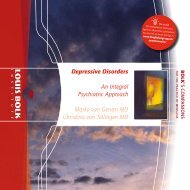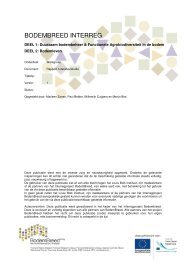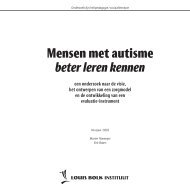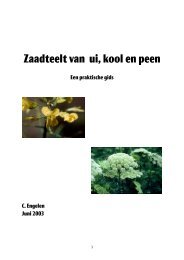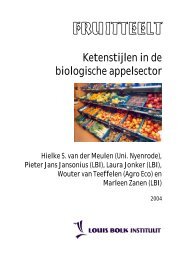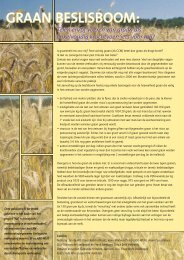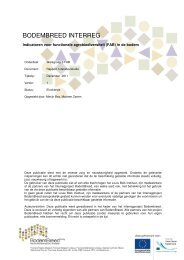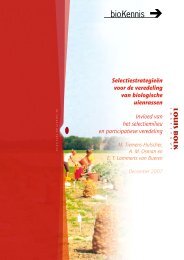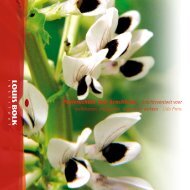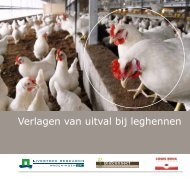Respiratory System Disorders and Therapy From a New - Louis Bolk ...
Respiratory System Disorders and Therapy From a New - Louis Bolk ...
Respiratory System Disorders and Therapy From a New - Louis Bolk ...
You also want an ePaper? Increase the reach of your titles
YUMPU automatically turns print PDFs into web optimized ePapers that Google loves.
BOLK’S COMPANIONS FOR THE STUDY OF MEDICINE<br />
Other publications in the series:<br />
Embryology<br />
Can we give a scientific basis to our<br />
feeling that humans have unique<br />
human features? Are the human mind<br />
<strong>and</strong> the human organism ‘nothing but’<br />
another variation of animal life? Can<br />
we find answers for these questions<br />
that satisfy both head <strong>and</strong> heart?<br />
How these questions are answered<br />
depends on the scientific method we<br />
use. In this publication two methods<br />
are used: the current scientific method<br />
to learn about biological facts <strong>and</strong><br />
the phenomenological method to<br />
underst<strong>and</strong> more about the meaning<br />
of these facts.<br />
Early embryological development<br />
can teach us about the unique <strong>and</strong><br />
characteristic qualities of the human<br />
being.<br />
The result is, for example, a possibility<br />
to underst<strong>and</strong> the relation between<br />
consciousness, psychology, <strong>and</strong><br />
behavior <strong>and</strong> the shape of the body.<br />
I N S T I T U T E<br />
Embryology<br />
BOLK’S COMPANIONS<br />
FOR‑THE STUDY OF MEDICINE<br />
EMBRYOLOGY<br />
Early development<br />
from a phenomenological<br />
point of view<br />
Guus van der Bie, M.D.<br />
Embryology<br />
Early development from a<br />
Phenom enological Point of View<br />
Guus van der Bie, M.D.<br />
Publicationnumber GVO 01<br />
Can we give a scientific basis to our<br />
feeling that humans have unique<br />
human features? Are the human<br />
mind <strong>and</strong> the human organism<br />
‘nothing but’ another variation of<br />
animal life? Can we find answers for<br />
the questions that satisfy both head<br />
<strong>and</strong> hart?<br />
How these quetions are answered<br />
depends on the scientific method<br />
we use: the current scientific<br />
method to learn about biological<br />
facts <strong>and</strong> the phenomenological<br />
method to underst<strong>and</strong> more about<br />
the meaning of these facts.<br />
Early embryological development<br />
can teach us about the unique<br />
<strong>and</strong> characteristic qualities of the<br />
human being.<br />
The result is, for example, a<br />
possibility to underst<strong>and</strong> the<br />
relation between consciousness,<br />
psychology, <strong>and</strong> behavior <strong>and</strong> the<br />
shape of the body.<br />
Biochemistry<br />
Metabolism from a<br />
Phenom enological Point of View<br />
Christina van Tellingen, M.D.<br />
Publicationnumber GVO 02<br />
Biochemistry offers insight into<br />
the continuous changes within<br />
the human organism. But can<br />
we maintain awareness of the<br />
coherence of the (changing)<br />
organism as we study the details?<br />
How can the many processes be<br />
understood as prototypical aspects<br />
of a unique organism?<br />
The scope of the answers to<br />
these questions can be enhanced<br />
by using a combination of the<br />
current scientific method <strong>and</strong><br />
a phenomenological method<br />
developed specifically to research<br />
the coherence of processes<br />
within living organisms. The<br />
current scientific method is used<br />
to discover biological facts. The<br />
phenomenological approach helps<br />
us in finding the meaning of the<br />
facts.<br />
What emerges is a new grasp<br />
of the inter relations between<br />
biological processes, consciousness,<br />
psychology, <strong>and</strong> behavior.<br />
<strong>Bolk</strong>’s Companions RespiRatoRy system DisoRDeRs anD theRapy - 119



